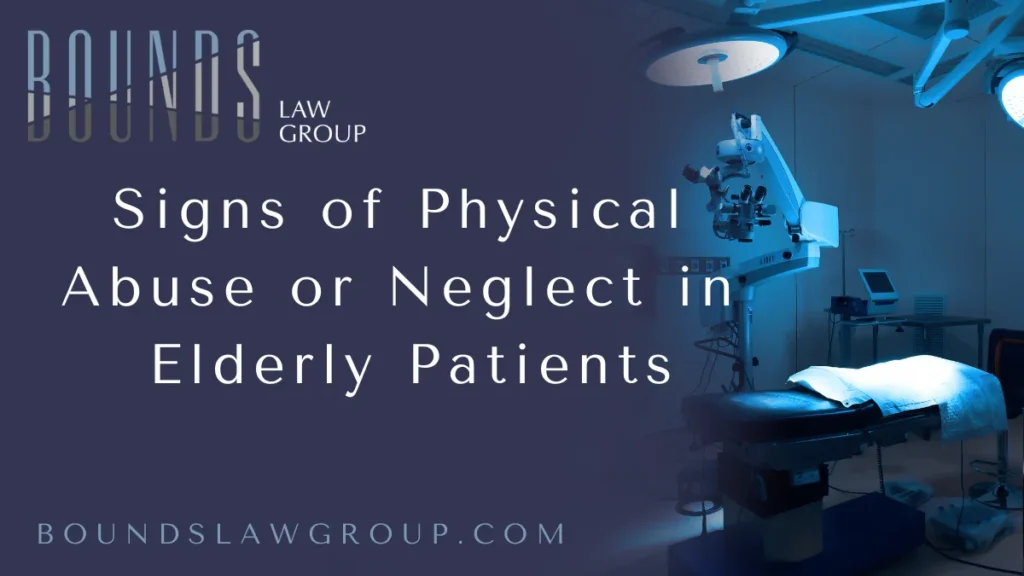
Signs of Physical Abuse or Neglect | Bounds Law Group
Elderly individuals in nursing homes deserve to live with dignity, care, and compassion. However, countless seniors across the nation suffer silently due to elder abuse nursing home situations that go unreported or unnoticed. At Bounds Law Group, we believe in standing up for vulnerable seniors and holding negligent facilities accountable. Identifying the signs of physical abuse or neglect in elderly patients is a crucial first step toward justice.
Contact us now at 877-644-5122 or complete the free case evaluation form for expert legal assistance.
What Is Elder Abuse in Nursing Homes?
Elder abuse nursing home cases involve harm or neglect inflicted upon seniors living in long-term care facilities. Abuse can be intentional or the result of negligence, but either form is unacceptable and can lead to severe emotional, psychological, or physical consequences.
There are several categories of elder abuse, including:
- Physical abuse
- Neglect
- Emotional or psychological abuse
- Sexual abuse
- Financial exploitation
We will focus on physical abuse and neglect, which are among the most common—and often most visible—forms of mistreatment in nursing homes.

Physical Signs of Elder Abuse Nursing Home Victims
When seniors are physically abused, their bodies often carry visible evidence. Knowing these indicators can help loved ones recognize and respond to abuse quickly.
Unexplained Bruises or Injuries
Bruises in unusual locations—such as the inner arms, thighs, or torso—can indicate rough handling or intentional harm. Multiple bruises in various stages of healing are particularly alarming.
Fractures and Broken Bones
Falls do happen in elderly populations, but frequent or unexplained fractures could be signs of elder abuse nursing home neglect or direct physical assault.
Burns or Scald Marks
Cigarette burns, scalds from hot water, or marks from restraints may indicate intentional harm.
Sprains or Dislocations
Improper lifting or physical restraint can lead to joint injuries, which are often downplayed or hidden by staff.
Frequent Hospitalizations
Frequent or repeat visits to hospitals, especially when not disclosed to family, may suggest a pattern of abuse or ongoing neglect.
Behavioral Indicators of Abuse and Neglect
Even when physical evidence is absent, emotional and behavioral changes may reveal hidden abuse.
Withdrawal and Depression
Victims of elder abuse nursing home scenarios often become withdrawn, anxious, or depressed. A once-social resident may suddenly avoid interaction or become unresponsive.
Fearfulness Around Staff
An irrational fear or sudden quietness when certain staff members are present could be a sign the resident is being mistreated by that caregiver.
Sudden Changes in Routine or Mood
Rapid personality changes—such as aggression, irritability, or disinterest—can point to abuse, especially if there are no underlying medical causes.
Reluctance to Be Touched
Physical abuse survivors may flinch or pull away when touched, a direct result of trauma or fear of being hurt again.
Signs of Neglect in Elderly Nursing Home Residents
Neglect is a passive but deadly form of elder abuse nursing home mistreatment. It occurs when staff fail to provide basic care, leading to declining health or death.
Malnutrition and Dehydration
Weight loss, dry skin, and sunken eyes may signal inadequate nutrition or hydration. Residents often rely entirely on staff to monitor dietary needs.
Bedsores (Pressure Ulcers)
Bedsores form when immobile patients are not repositioned regularly. These sores are extremely painful and can become infected if left untreated.
Poor Hygiene and Unkempt Appearance
Soiled clothing, overgrown nails, matted hair, or strong body odor point to a lack of proper hygiene care.
Unsanitary Living Conditions
Dirty bedding, food remnants, pests, or strong odors in the resident's room indicate that staff are failing to maintain clean and safe conditions.
Infections and Illnesses
Frequent infections, especially urinary tract infections or skin conditions, can signal that medical care and basic hygiene are being ignored.
Why Elder Abuse in Nursing Homes Happens
Elder abuse in nursing homes can result from several systemic and human failings, including:
- Understaffing: Many facilities are severely understaffed, causing overworked caregivers to neglect duties or lash out in frustration.
- Inadequate Training: Poorly trained staff may not understand proper care procedures or how to handle residents with dementia or mobility challenges.
- Negligent Supervision: Lack of oversight can allow abusers to operate unchecked or neglect to be ignored by management.
- Toxic Work Culture: A culture that tolerates mistreatment or turns a blind eye to complaints fosters a dangerous environment.
Steps to Take if You Suspect Elder Abuse Nursing Home Situations
If you suspect your loved one is being abused or neglected, swift action can make the difference between continued suffering and safety.
- Document Everything – Take photos of injuries or poor conditions and keep a record of conversations with staff and management.
- Report to Authorities – Contact your state’s Adult Protective Services or long-term care ombudsman.
- Seek Immediate Medical Attention – Ensure your loved one gets necessary care right away.
- Contact a Legal Advocate – Call Bounds Law Group for experienced legal support.
We are dedicated to holding negligent nursing homes accountable and protecting the elderly from further harm.

How Bounds Law Group Can Help
At Bounds Law Group, we are fierce advocates for justice. Our experienced team of elder abuse nursing home attorneys has a proven record of pursuing accountability and securing compensation for victims of abuse and their families.
We work with medical experts, investigators, and your family to build a strong case that exposes the abuse and ensures your loved one’s rights are protected. Whether through settlement or litigation, our goal is always the same: justice and safety.
If you suspect elder abuse in a nursing home, complete our free case evaluation form or call us now at 877-644-5122 to speak directly with a legal expert. We are here to help.
Legal Rights of Nursing Home Residents
Every resident in a nursing home is entitled to fundamental legal rights, and these protections are essential when facing a potential elder abuse nursing home situation. These rights exist to ensure dignity, safety, and autonomy for seniors under care, and any violation can be grounds for legal action.
Federal and State Protections
Under the Nursing Home Reform Act of 1987, all residents in federally funded nursing homes have the right to:
- Be treated with dignity and respect
- Make decisions about their care
- Be free from abuse, neglect, and exploitation
- Voice grievances without fear of retaliation
- Receive proper medical treatment
- Participate in planning their care
- Maintain privacy and confidentiality
- Have unrestricted access to family and advocates
In addition to federal laws, each state has its own long-term care residents’ bill of rights, which may offer expanded protections and stricter requirements for care facilities.
Violation of Resident Rights
When these rights are ignored or violated, it often correlates with neglect or abuse. For example:
- Denial of medical treatment may result in untreated infections.
- Restricting visitation can isolate a resident and hide abusive behavior.
- Ignoring complaints may allow continued mistreatment.
Any breach of these rights may indicate a broader issue of systemic negligence and should be investigated immediately.
Advocacy and Enforcement
Residents and families can report violations to their state’s long-term care ombudsman, who is responsible for investigating complaints and advocating for residents. Legal action can also be taken against facilities that fail to protect these rights.
At Bounds Law Group, we help families understand their legal options, document violations, and pursue justice on behalf of their loved ones. Abuse and neglect are not just moral wrongs—they are legal violations, and we are prepared to fight for accountability.
If you believe your loved one’s legal rights have been violated in a nursing home, complete our free case evaluation form or call us now at 877-644-5122 to speak with a dedicated elder abuse attorney.
No one deserves to live in fear, especially our elderly loved ones. By staying vigilant, recognizing the signs of elder abuse nursing home, and acting swiftly, you can protect vulnerable seniors from harm and ensure that those responsible are held fully accountable.
Let Bounds Law Group be your voice in the fight against nursing home abuse. Justice for your loved one starts with one call.
Sources
- National Center on Elder Abuse (NCEA) – Offers educational materials and statistics about elder mistreatment in long-term care facilities.
https://ncea.acl.gov - Centers for Disease Control and Prevention (CDC) – Provides key data and public health insights on elder abuse.
https://www.cdc.gov/violenceprevention/elderabuse/index.html - Administration for Community Living (ACL) – Supports programs and policy initiatives that protect the rights of older Americans.
https://acl.gov/programs/elder-justice/elder-justice-act

